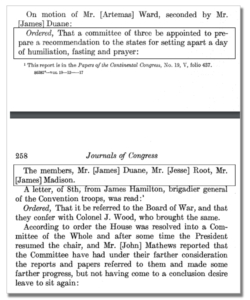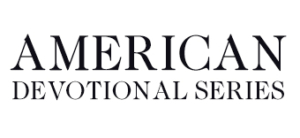March 20, 1781
During the Revolutionary War, Congress issued sixteen proclamations calling for a National Day of Prayer, Fasting and Humilation.
Take a look at the table below. You can click on the “page one | page two” links in the “Journals of the Continental Congress (1774 – 1875)” column to see the image of the text as it’s preserved in the Library of Congress and you can click on the “text” link to view a more “readable” version of the text.”
| Date / Proclamation | Journals of the Continental Congress (1774 – 1875) | text |
| July 20, 1775 | page one | page two | text |
| March 16, 1776 | page one | page two | text |
| December 11, 1776 | page one | text |
| November 1, 1777 | page one | page two | text |
| March 6, 1778 | page one | page two | text |
| November 16, 1778 | page one | text |
| March 20, 1779 | page one | page two | text |
| October 14, 1779 | page one | page two | text |
| March 11, 1780 | page one | page two | text |
| October 18, 1780 | page one | page two | text |
| March 20, 1781 | page one | page two | text |
| October 26, 1781 (British Surrender) | page one | page two | text |
| March 19, 1782 | page one | page two | text |
| October 11, 1782 | page one | text |
| October 18, 1783 | page one | page two | text |
| August 3, 1784 | page one | page two | text |
There’s one proclamation in particular that’s especially significant given the fact that among the three man team assigned to craft the verbiage was James Madison.
Madison is sometimes referred to as someone who was adamantly opposed to any kind of offical endorsement of the Christian mindset. You see that in the way commentators will present his “Memorial and Remonstrance” which was a document outlining why he disagreed with using public monies to compensate “Teachers of the Christian Religion.”
While it’s tempting to assume that Madison’s hesitation in using public funds to finance Christian education was indicative of his desire to eliminate any reference to Christ in the marketplace, you can only arrive at that conclusion if you ignore his words and actions while serving in Congress – specifically his obviously being in favor of a corporate posture of prayer and worship.
In addition to his voting in the affirmative for the above proclamations, you also have his involvement in the wording of the Proclamation issued on the 20th of March 1781.
 The report of the committee appointed to prepare a recommendation to these states, to set apart a day of humiliation and prayer was taken into consideration; and thereupon, The United States in Congress assembled, agreed to the following proclamation:
The report of the committee appointed to prepare a recommendation to these states, to set apart a day of humiliation and prayer was taken into consideration; and thereupon, The United States in Congress assembled, agreed to the following proclamation:
At all times it is our duty to acknowledge the over-ruling providence of the great Governor of the universe, and devoutly to implore his divine favor and protection. But in the hour of calamity and impending danger, when by fire and the sword, by the savages of the wilderness, and by our own domestics, a vindictive enemy pursues a war of rapine and devastation, with unrelenting fury, we are peculiarly excited, with true penitence of heart to prostrate ourselves before our great Creator, and fervently to supplicate his gracious interposition for our deliverance.
The United States in Congress assembled, therefore do earnestly recommend, that Thursday the third day of May next, may be observed as a day of humiliation, fasting and prayer, that we may, with united hearts, confess and bewail our manifold sins and transgressions, and by sincere repentance and amendment of life, appease his righteous displeasure, and through the merits of our blessed Saviour, obtain pardon and forgiveness: that it may please him to inspire our rulers with wisdom and uncorruptible integrity, and to direct and prosper our councils: to inspire all our citizens with a fervent and disinterested love of their country, and to preserve and strengthen their union: to turn the hearts of the disaffected, or to frustrate their devices: to regard with divine compassion our friends in captivity, affliction and distress, to comfort and relive them under their sufferings, and to change their mourning into grateful songs of triumph: that it my please him to bless our ally, and to render the connection formed between these United States and his kingdoms a mutual and lasting benefit to both nations: to animate our officers and forces by the sea and land with invincible fortitude, and to guard and protect them in the day of battle, and to crown our joint endeavors for terminating the calamities of war with victory and success: that the blessings of peace and liberty may be established on an honorable and permanent basis, and transmitted inviolate to the latest posterity: that it my please him to prosper our husbandry and commerce, and to bless us with health and plenty: that it may please him to bless all schools and seminaries of learning, and to grant that truth, justice and benevolence, and pure and undefiled religion, may universally prevail.
And it is recommended to all the people of these states, to assemble for public worship, and abstain from labour on the said day.
You can see a copy of this Proclamation as it’s preserved in the Library of Congress by clicking here. To view the Proclamation itself, you’ll find that on page 285 (page 297 according to the PDF document). To see the list of individuals tasked with creating the Proclamation, you’ll find that on pages 257-258. If you’re going by the page numbers as they’re accounted for by the PDF document, you’ll find it on page 269-270.




Leave a Reply
Want to join the discussion?Feel free to contribute!